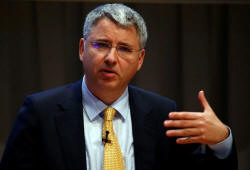|
 Roche
to seize leap-frog opportunity in lung cancer Roche
to seize leap-frog opportunity in lung cancer
 Send a link to a friend
Send a link to a friend
[December 07, 2017] By
Ben Hirschler
LONDON (Reuters) - After lagging rivals in
cancer immunotherapies, Swiss drugmaker Roche hopes to leap-frog into
the lead in the biggest market, tackling previously untreated lung
cancer.
|
|
 "We have a real chance to be at the forefront here," Chief Executive
Severin Schwan said on Wednesday. "Our ambition is to become a clear
leader in the field of cancer immunotherapies." "We have a real chance to be at the forefront here," Chief Executive
Severin Schwan said on Wednesday. "Our ambition is to become a clear
leader in the field of cancer immunotherapies."
At the same time he warned many investors would lose money across
the industry as a large proportion of the hundreds of cancer trials
now underway failed, leaving just a few winners.
His optimism for Roche has been buoyed by study results showing its
immune-boosting medicine Tecentriq given with chemotherapy and the
older drug Avastin significantly cut the risk of lung cancer
worsening.
Researchers will detail the scale of that benefit, versus
chemotherapy and Avastin alone, in a keenly awaited presentation at
a medical meeting in Geneva on Thursday.

"We have the potential to get into the lead in first-line lung
cancer," Schwan said. "In all likelihood we have a medicine here
that will potentially change the standard of care ... but we will
also have to see how it compares with other therapies."
Overall survival (OS) data will also be crucial in determining the
ultimate winner in lung cancer - by far the biggest oncology market
- since one of the main benefits of using immunotherapy is its
long-lasting effects.
Roche does not yet have that OS data but initial observations are
"encouraging" and it expects results in the first half of 2018, well
ahead of OS findings with a competing drug combination including
chemotherapy from Merck & Co.
Roche and Merck have led the way in pioneering so-called
"chemo-combo" treatment, while AstraZeneca and Bristol-Myers are
betting mainly on mixing two immunotherapies, although AstraZeneca
failed to show any initial benefit with this approach in a
high-profile trial in July.
Currently, Tecentriq's sales - expected to total around $500 million
this year - are well behind the $3.7 billion and $4.8 billion
expected respectively in 2017 for Merck's Keytruda and Bristol's
Opdivo, the current market leaders.
[to top of second column] |

But analysts at Jefferies believe Tecentriq could sell $6.2 billion
by 2021, bolstered by its promise in drug cocktails.
Tecentriq is one of several new drugs Roche is relying on to be a
success to help replace revenue from older biological cancer drugs
whose patents have expired or will shortly, exposing them to cheaper
so-called biosimilar competition.
"On the pipeline side, we're even more de-risked than a year ago ...
but there is no doubt that the impact from biosimilars will be
significant," Schwan told Reuters.
"On balance, I'm now very confident that we should be able to
compensate for this erosion."
Cancer research is today the hottest area of drug research, with
dozens of companies conducting hundreds of clinical trials, many of
which Schwan said would fail.
"There will be an enormous drop-out from all these clinical trials,
which means a lot of people that invested into these trials will
lose money."
(Reporting by Ben Hirschler; Editing by Alexander Smith and Edmund
Blair)
[© 2017 Thomson Reuters. All rights
reserved.] Copyright 2017 Reuters. All rights reserved. This material may not be published,
broadcast, rewritten or redistributed.
 |